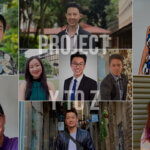This is the sixth of a seven-part ‘Project Y to Z’ series.
Project Y to Z is a ground-up initiative spearheaded by three university students—Jessica Lee and Ray Leow from the Singapore Management University (SMU), together with Lim Xuan Zheng from Nanyang Technological University (NTU). They may be a small team of three, but their ambitions for this initiative are far from small. Their hope is for Project Y to Z to be a community catalyst that brings Gen Yers and Zers closer together by sharing experiences, encouraging interactions and sparking conversations. In this project, they lay bare the realities of past job search experiences told by Gen Y 2008 graduates in Singapore who survived the Global Financial Crisis and lived to tell the tale.
By Ray Leow Wei Jian, Class of 2020 Graduand, SMU Lee Kong Chian School of Business
For our penultimate Project Y to Z sharing, we are delighted to have Singapore Management University alumnus, Woo Jian Sheng. He is a Business graduate from the class of 2008 and currently works as a Senior Consultant at the Singapore Tourism Board.
As an analytical market research professional, he is always inquisitive and passionate about solving real-world problems with data. Right before the chat, he was poring over gigabytes of data at work. Our chat was certainly a refreshing switch to something more light-hearted. We took a walk down memory lane with Jian Sheng as he re-lived his job search experience during the Global Financial Crisis. Read on to learn more about how he landed his first job!
Here are 3 key things you will learn:
- Start strong: Have the right mindset
- Say ‘hi’: Make friends with everybody
- Stay hungry: Knowledge multiplies your value
Among your friends, were you the first few to receive a job offer?
Yes, largely due to the fact I started my job hunting process in end-February compared to those who began in April or May when the semester ended. I went for several career talks, ranging from various banks to Nike to Boston Consulting Group. Usually, they will end the career talk with a call to action to submit your resumes, which was what I did. I guess it was applying for a job through the most convenient way. *laugh*
I guess I got myself in the right place at the right time.
The interview process happened around March and that was when I was given the offer (from Millward Brown). My first reaction? “Wah, you sure you want to chope me that early?” I then told them that it was too early for me to decide. So I went for my graduation trip, came back and asked if the offer was still on—it was. Because of the impression I made during the interview, I managed to convince them to give that vacancy to me.
What was your job search mentality back then?
I guess I was quite a risk-taker. Besides Millward Brown, I applied for one or two companies but did not hear from them. I did not attend any other interviews or receive any other offers. The offer was given in March, and I guess complacency set in; but in hindsight, it’s definitely not a recommended mentality to have in this climate. My career trajectory might have turned out totally different.
“Who cares if you got a near perfect SAT score and was a Dean’s lister… These might get your foot in the door, but ultimately it is your attitude that secures you the job.”
How can our readers improve their interview skills?
To get the job, you need to get your game face on and show your eagerness for the job.
What does that entail? Make an effort to understand the company and competition. Keep in mind that employers are looking for people to provide solutions, not problems. When there’s a problem, you have to come up with a few solutions and present it to your boss. Show that you are more than willing to roll up your sleeves to get your hands dirty to get the job done. Who cares if you got a near perfect SAT score and was a Dean’s lister in your last two years of university? These might get your foot in the door, but ultimately it is your attitude that secures you the job.
What is one thing that fresh graduates should look out for in their new jobs?
Starting a job with the right mindset is very important. Be prepared to do everything, work long hours and take on extra projects to prove yourself to the team that you can contribute value.
I would reach the office at 9am, do everything and when my colleagues start to wrap up work at 6pm that’s when I start my “second shift’’ work which involves more quiet time to think. I would only leave the office after 11pm. There wasn’t Grab when I started work in 2008, so I would call the ComfortDelgro hotline to book a cab. The melody which they played while waiting to confirm my booking accompanied me for the first three years of my career. That melody brings back a wave of memories and emotions, even to this day.
Eventually, I got recognised for my efforts and was fast-tracked on the path to directorship. People always lament that they want work-life balance. There’s no such thing called work-life balance, only work-life harmony. It is not a zero-sum game where you can achieve the elusive 8-hour work, 8-hour play and an 8-hour sleep lifestyle. So you really need to find ways to keep your sanity, not to throw in the towel that easily. Some of my colleagues left pretty early on in their career and chose to work in other companies and industries which were less demanding on their working hours. Looking back, it helped that I had the right mindset and loved what I did. It helped me thrive and if given a chance to live my 20s again, I wouldn’t change a thing.
I will summarise all that into one word: grit. Grit helped me keep the right mindset and a cool head when others were losing theirs.
So what’s your secret for staying in a company for so long?
Be friends with everybody. And do it sincerely.
Think about it. When times are really tough and you have a job opening or an opportunity within the company, who would you want to give it to? Would you want to offer it to someone whom you have not met or heard of before, or would you want to offer it to someone in your network who others can also vouch for?
Knowing this, I always made a conscious effort to go beyond my current team and chat with colleagues from other teams, across all levels. I know that sometimes the senior management might look like the serious, no-nonsense type. But deep inside, they are just like us—they have a life outside of work, like to unwind and have fun, have their own hobbies and pet peeves. During my six years in Millward Brown, I was given numerous opportunities to work with other teams, and even though I was shifted thrice to new teams it always went well because I already knew someone in these teams.
Being in the private sector for a number of years, what’s your motivation for switching to the public sector eventually?
I wanted a change of pace and to start a family. At the same time, as a client-facing consultant, I felt that my work had a limited impact beyond the final presentation. I was often not privy to the eventual business decisions made by the client.
I felt that I could make a greater impact by being on the client side.
As to why I eventually chose a government agency: I believed that our government agencies have the capabilities to shape and lead change in their industry on a scale that no individual firm can. Looking at how the Singapore Tourism Board is helping the tourism industry pivot during difficult times like this—it reaffirms the choice that I made slightly over five years ago.
So what are some things that job seekers who are wanting to start a career in the public service should look out for?
Utmost integrity and the desire to serve others with excellence are cornerstones of public service. The nature of public service is that the work is funded by taxpayers, so financial prudence is crucial.
I constantly remind myself that my work is funded by taxes from everyone, from my uncle who is postponing his retirement to be a Grab driver to shore up his savings, the McDonald auntie who earns minimum wage and always greets me with a smile, to my neighbours who are putting their two sons through school on a single income.
They are trusting me with their hard-earned money, and as a public servant, I have the moral duty to use it wisely.
Also, as a public servant, you are the face of the government so your actions must contribute towards the betterment of the country and for the people at all times. Being service-oriented definitely helps.
What’s one difference between the batch of 2008 and the batch of 2020?
Honestly, we are darn scared of you guys.
Ignoring the years of working experience, if we were to apply for the same job, the batch of 2020 might be more eligible than us. The batch of 2020 are well equipped with the technical skills needed for many jobs today and the future, so take comfort in that, but don’t rest on your laurels. Have a life-long learning mindset.
If you could travel back in time to 2008, what would you have changed for your job search process?
I would have put myself out there more. I would have gone for more interviews, attended more career fairs, and made the effort to get a better understanding of how different industries operate. Having a broad understanding can benefit you in the long run, because you will not be siloed into your own industry. Having the breadth of knowledge can help you see new opportunities. It’s the Blue Ocean strategy, but applied to an individual.
You are your biggest investment and it makes sense to invest the time and resources to continue to learn.
“As the saying goes, ‘tough times don’t last, but tough people do’.”
What is one action that job seekers can take right now given this Covid-19 situation?
Have faith in yourself and don’t give up.
As the saying goes, ‘tough times don’t last, but tough people do’. I’m sure you have heard of that quote. Having the right mindset is a good start, and be proactive in your job hunt. You can’t expect to sit at home and wait for the storm to pass. Being resilient is about going “out” to build your network, and acquiring new skills and knowledge. It will indirectly open new doors and new opportunities. Read up on new industries, talk to people, talk to parents, friends and even your neighbours. Binge watching Netflix certainly wouldn’t help. Why not use this time to volunteer?
Do something meaningful. You’ve only got one life so make the most out of it.
This article was originally published on LinkedIn and has been republished with permission.








